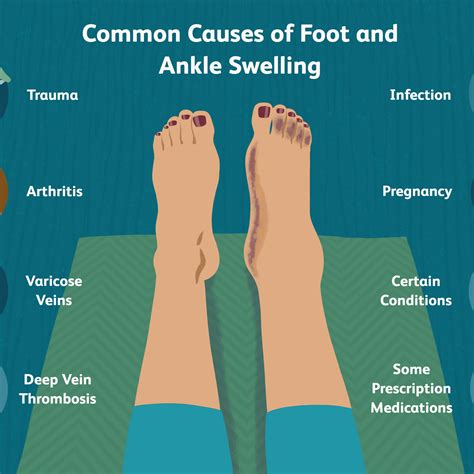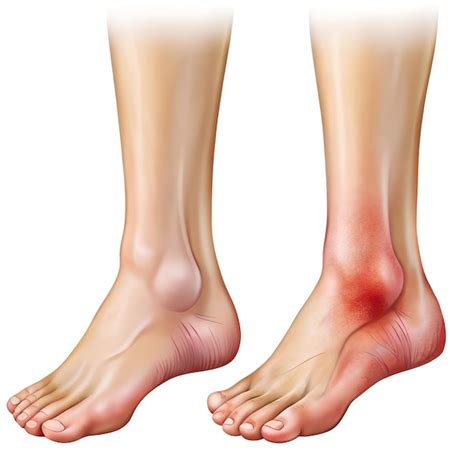Intro
Discover causes and remedies for swollen ankles during pregnancy, including water retention, blood pressure, and circulation issues, to alleviate discomfort and promote healthy pregnancy.
Pregnancy is a unique and exciting time in a woman's life, filled with numerous physical and emotional changes. One common complaint among pregnant women is swollen ankles, also known as edema. This condition can be uncomfortable and may cause concern, but it is often a normal part of pregnancy. As the body undergoes significant changes to support the growing fetus, it is essential to understand the causes and effects of swollen ankles during pregnancy.
The human body is incredibly resilient, and pregnancy is a testament to its ability to adapt and change. During pregnancy, the body produces more blood and fluids to meet the needs of the growing fetus. This increase in fluid can lead to swelling in various parts of the body, including the ankles. Additionally, the growing uterus can put pressure on the veins in the legs, causing fluid to accumulate and resulting in swollen ankles.
Pregnant women often experience a range of symptoms, from mild discomfort to severe pain, due to swollen ankles. In some cases, the swelling can be so severe that it becomes difficult to walk or engage in daily activities. It is crucial to address this issue to ensure a healthy and comfortable pregnancy. Understanding the causes, symptoms, and treatment options for swollen ankles during pregnancy can help expectant mothers manage this condition and enjoy a more comfortable pregnancy.
Causes of Swollen Ankles During Pregnancy

Symptoms of Swollen Ankles During Pregnancy
The symptoms of swollen ankles during pregnancy can vary from mild to severe and may include: * Swelling in the ankles, feet, and hands * Redness and warmth in the affected areas * Pain or discomfort in the legs and ankles * Difficulty walking or standing due to swelling and pain * Tingling or numbness in the legs and anklesTreatment Options for Swollen Ankles During Pregnancy

Home Remedies for Swollen Ankles During Pregnancy
In addition to medical treatment, there are several home remedies that can help manage swollen ankles during pregnancy. Some of these remedies include: * Cold compresses: Applying cold compresses to the affected areas can help reduce swelling and pain. * Epsom salt baths: Soaking in Epsom salt baths can help reduce inflammation and improve circulation. * Essential oils: Certain essential oils, such as peppermint and lavender, can help reduce inflammation and improve circulation. * Herbal teas: Drinking herbal teas, such as dandelion and ginger, can help reduce fluid retention and improve circulation.Prevention of Swollen Ankles During Pregnancy

Risk Factors for Swollen Ankles During Pregnancy
Certain risk factors can increase the likelihood of developing swollen ankles during pregnancy. Some of these risk factors include: * History of swelling during previous pregnancies * Family history of swelling during pregnancy * Carrying multiples (twins, triplets, etc.) * Having a history of high blood pressure or kidney disease * Being overweight or obeseComplications of Swollen Ankles During Pregnancy

When to Seek Medical Attention
It is essential to seek medical attention if symptoms of swollen ankles during pregnancy persist or worsen over time. Some signs that may indicate a need for medical attention include: * Severe swelling that does not improve with rest and elevation * Pain or discomfort that worsens over time * Redness or warmth in the affected areas * Difficulty walking or standing due to swelling and pain * Fever or chillsConclusion and Final Thoughts

We invite you to share your experiences and thoughts on swollen ankles during pregnancy in the comments below. Have you experienced swollen ankles during pregnancy? What steps did you take to manage this condition? Share your story and help other expectant mothers understand and manage swollen ankles during pregnancy.
What are the primary causes of swollen ankles during pregnancy?
+The primary causes of swollen ankles during pregnancy are the increase in blood volume and fluid retention, increased pressure on the veins in the legs due to the growing uterus, hormonal changes, poor circulation, and high sodium intake.
How can I prevent swollen ankles during pregnancy?
+To prevent swollen ankles during pregnancy, maintain a healthy weight, engage in regular exercise, eat a balanced diet, avoid standing or sitting for long periods, and wear comfortable shoes.
What are the potential complications of swollen ankles during pregnancy?
+Potential complications of swollen ankles during pregnancy include preeclampsia, deep vein thrombosis, gestational hypertension, and kidney disease.
When should I seek medical attention for swollen ankles during pregnancy?
+Seek medical attention if symptoms of swollen ankles during pregnancy persist or worsen over time, or if you experience severe swelling, pain, or discomfort, redness or warmth in the affected areas, difficulty walking or standing, or fever or chills.
Can I use home remedies to manage swollen ankles during pregnancy?
+Yes, there are several home remedies that can help manage swollen ankles during pregnancy, including cold compresses, Epsom salt baths, essential oils, and herbal teas. However, it is essential to consult with a healthcare provider before using any new remedies, especially if you have any underlying medical conditions.
